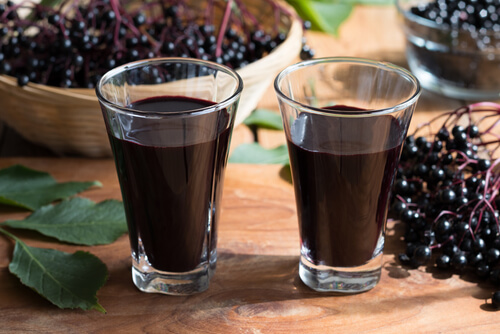
Elderberry is one of the most commonly used medicinal plants in the world. Traditionally, Native Americans used it to treat infections, while the ancient Egyptians used it to improve their complexions and heal burns. It is still gathered and used in folk medicine across many parts of Europe.
Today, Elderberry is most often taken as a supplement to treat cold and flu symptoms.
However, the raw berries, bark, and leaves of the plant are also known to be poisonous and cause stomach problems. Historically, the flowers and leaves have been used for pain relief, swelling, inflammation, to stimulate the production of urine and to induce sweating. The bark was used as a diuretic, laxative and to induce vomiting. In folk medicine, the dried berries or juice are used to treat influenza, infections, sciatica, headaches, dental pain, heart pain, and nerve pain, as well as a laxative and diuretic. Additionally, the berries can be cooked and used to make juice, jams, chutneys, pies and Elderberry wine. The flowers are often boiled with sugar to make a sweet syrup or infused into the tea. They can also be eaten fresh in salads.
There are many reported benefits of Elderberries. Not only are they nutritious, but they may also fight cold and flu symptoms, support heart health and fight inflammation and infections, among other benefits. The berries and flowers of the Elderberry are packed with antioxidants and vitamins that may boost your immune system. They can help tame inflammation, lessen stress, and help protect your heart, too. Some experts recommend Elderberry to help prevent and ease cold and flu symptoms.
1. High in Nutrients
Elderberries are a low-calorie food packed with antioxidants. Plus, they have many nutritional benefits. Elderberries are:
- High in vitamin C: There are 6–35 mg of vitamin C per 100 grams of fruit, which accounts for up to 60% of the recommended daily intake.
- High in dietary fiber: Elderberries contain 7 grams of fiber per 100 grams of fresh berries, which is over one-quarter of the recommended daily intake.
- A good source of phenolic acids: These compounds are powerful antioxidants that can help reduce damage from oxidative stress in the body.
- A good source of flavonols: Elderberry contains the antioxidant flavonols quercetin, kaempferol and isorhamnetin. The flowers contain up to 10 times more flavonoids than the berries.
- Rich in anthocyanins: These compounds give the fruit its characteristic dark black-purple color and are a strong antioxidant with anti-inflammatory effects.
While there is no one-size-fits-all remedy for illness, supporters of Elderberry say the fruit is one of nature’s most versatile solutions for what ails you.



